An essential ability for increasing productivity, successfully using your time, and accomplishing your goals is good week-long planning. A strong technique that helps keep you organized, focused, and in control of your duties and obligations is creating a daily plan that is well-arranged.
We will provide you the ideal foundation to efficiently arrange your week in this in-depth manual. This guide will provide you the information and techniques to develop a daily plan that positions you for success, whether you're a student, professional, busy parent, or just want to improve your time management abilities.
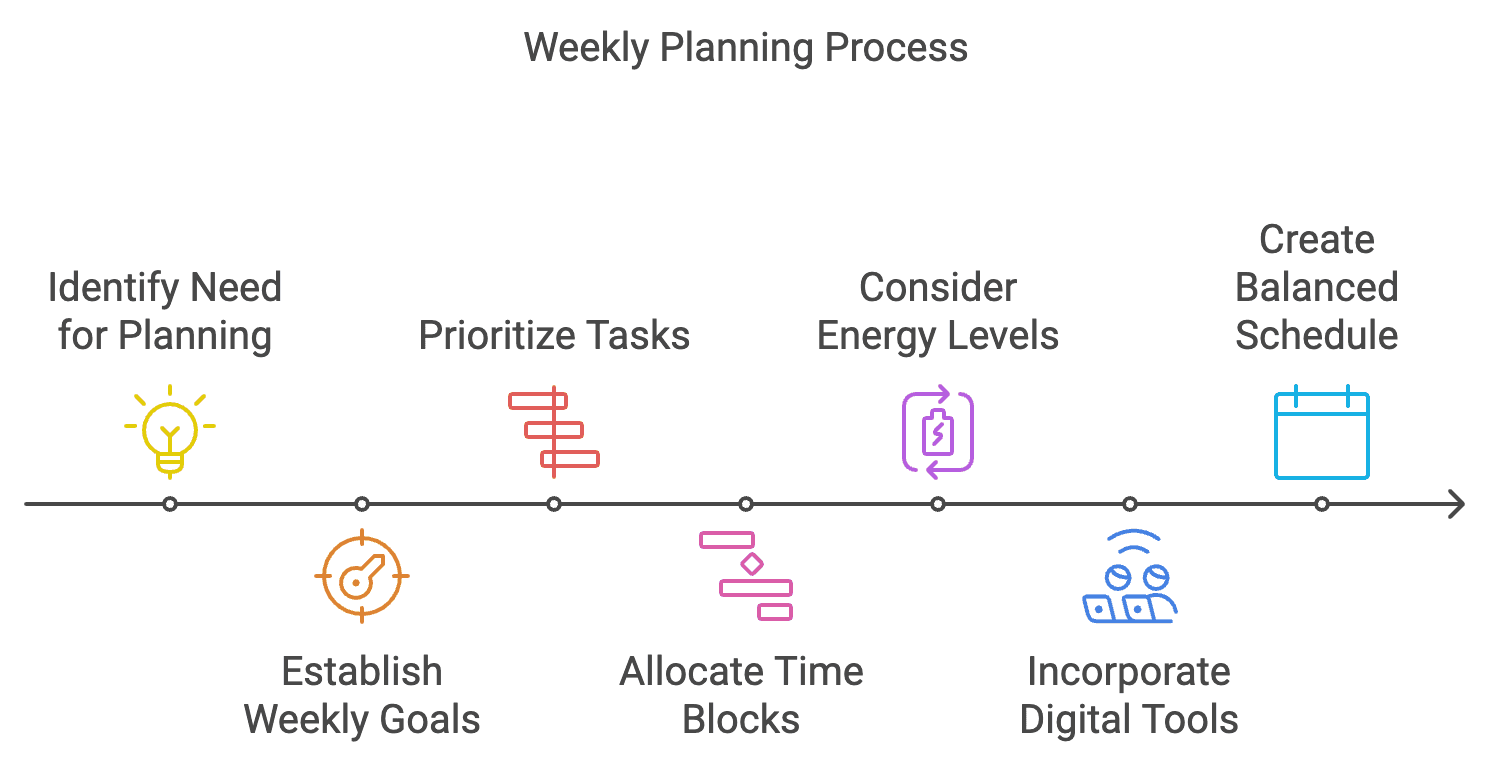
We will dig into useful ideas, tactics, and tried-and-true ways to help you maximize your productivity and make the most of every day, from setting priorities to scheduling time for particular activities, controlling distractions, and preserving work-life balance. Prepare to discover the secrets of productive weekly planning as you set out on a path to increased productivity, clarity, and fulfillment.
Let's get started and learn how to create a daily plan that works for you.
You might also like:
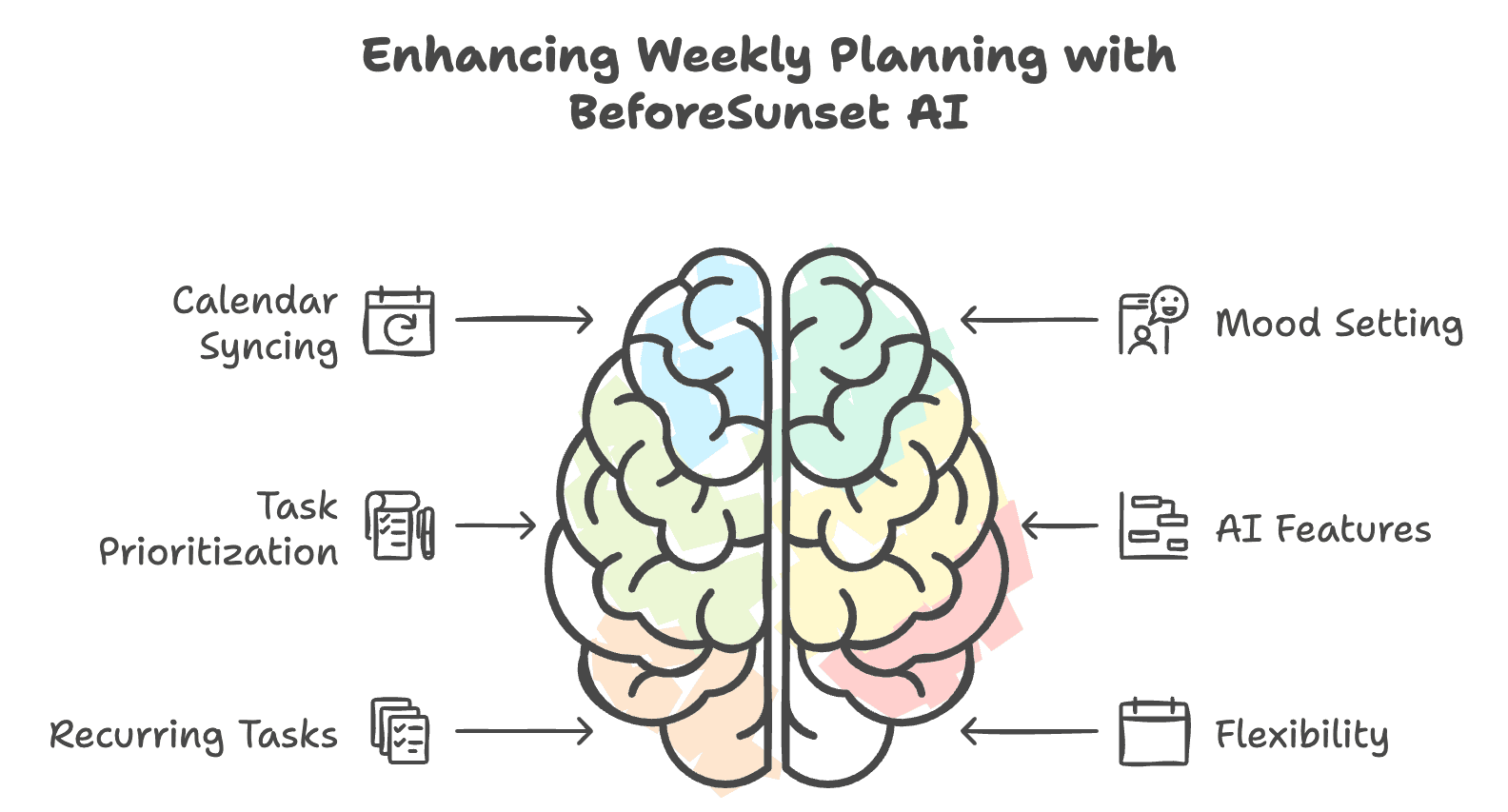
How to Use BeforeSunset AI to Plan Your Week
BeforeSunset AI is designed to enhance productivity by making weekly planning easier and more effective. Here’s how to make the most of it:
1. Sync Your Calendar: Start by syncing your digital calendar with BeforeSunset AI. This way, all your planned events for the upcoming week will appear in one place, giving you a comprehensive view of your time commitments.
2. Set Daily Moods and Add To-Dos: Every day, set your mood and add any new tasks to your to-do list. Tag these tasks based on projects or clients, which makes it easier to organize and filter your workload according to priority.
3. Assign Time and Prioritization Tags: For each task, add planned time and prioritization tags. This step ensures that you allocate enough time for each task and can easily distinguish between urgent tasks and those that can wait.
4. Use AI Features for Detailed Planning: BeforeSunset AI offers features like “Make It Actionable” and “Create Subtasks with AI.” These tools help break down large tasks into smaller, manageable steps, ensuring that no part of your weekly work plan is overlooked.
5. Set Up Recurring Tasks: If you have tasks that repeat on a weekly basis, set them up as recurring tasks. This feature helps you save time and makes it easier to maintain consistency without having to recreate tasks each week.
6. Stay Flexible: BeforeSunset AI lets you adjust your schedule when necessary. Unexpected events can arise, and a flexible weekly plan allows you to adapt without sacrificing progress on essential tasks.
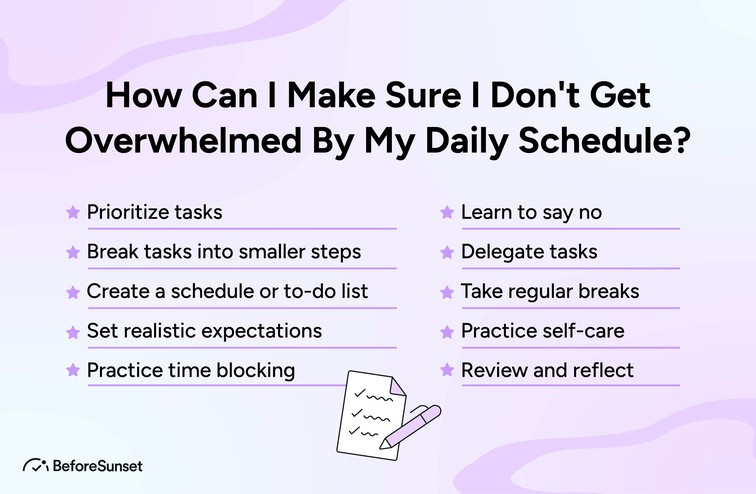
How Can I Make Sure I Don't Get Overwhelmed By My Daily Schedule?
To avoid getting overwhelmed by your daily schedule, it's important to implement strategies that promote balance and stress management.
Firstly, prioritize your tasks and focus on the most important ones that align with your goals. Break down larger tasks into smaller, manageable steps to make them more approachable. Be realistic about what you can accomplish in a day and avoid overloading your schedule. Learn to say no to additional commitments that might stretch you too thin. Take regular breaks throughout the day to rest and recharge.
Practice self-care activities like exercise, meditation, or hobbies to reduce stress. Seek support from colleagues, friends, or family when needed. Remember to be flexible and adjust your schedule when unexpected events occur. By implementing these strategies, you can create a balanced daily routine that minimizes overwhelm and promotes overall well-being.
Planning your week effectively can transform your productivity, giving you the clarity and structure needed to accomplish your goals.
Weekly planning helps streamline both personal and professional responsibilities, making it easier to achieve weekly goals, manage your time commitments, and carve out essential moments for personal time, family time, and quality time.
By following a structured approach, you can establish a balanced and sustainable weekly schedule.
This guide will walk you through creating a successful weekly work plan, including strategies to help you plan the week in advance, prioritize tasks, and organize your entire week with digital tools like BeforeSunset AI, which enhances planning sessions and time management.
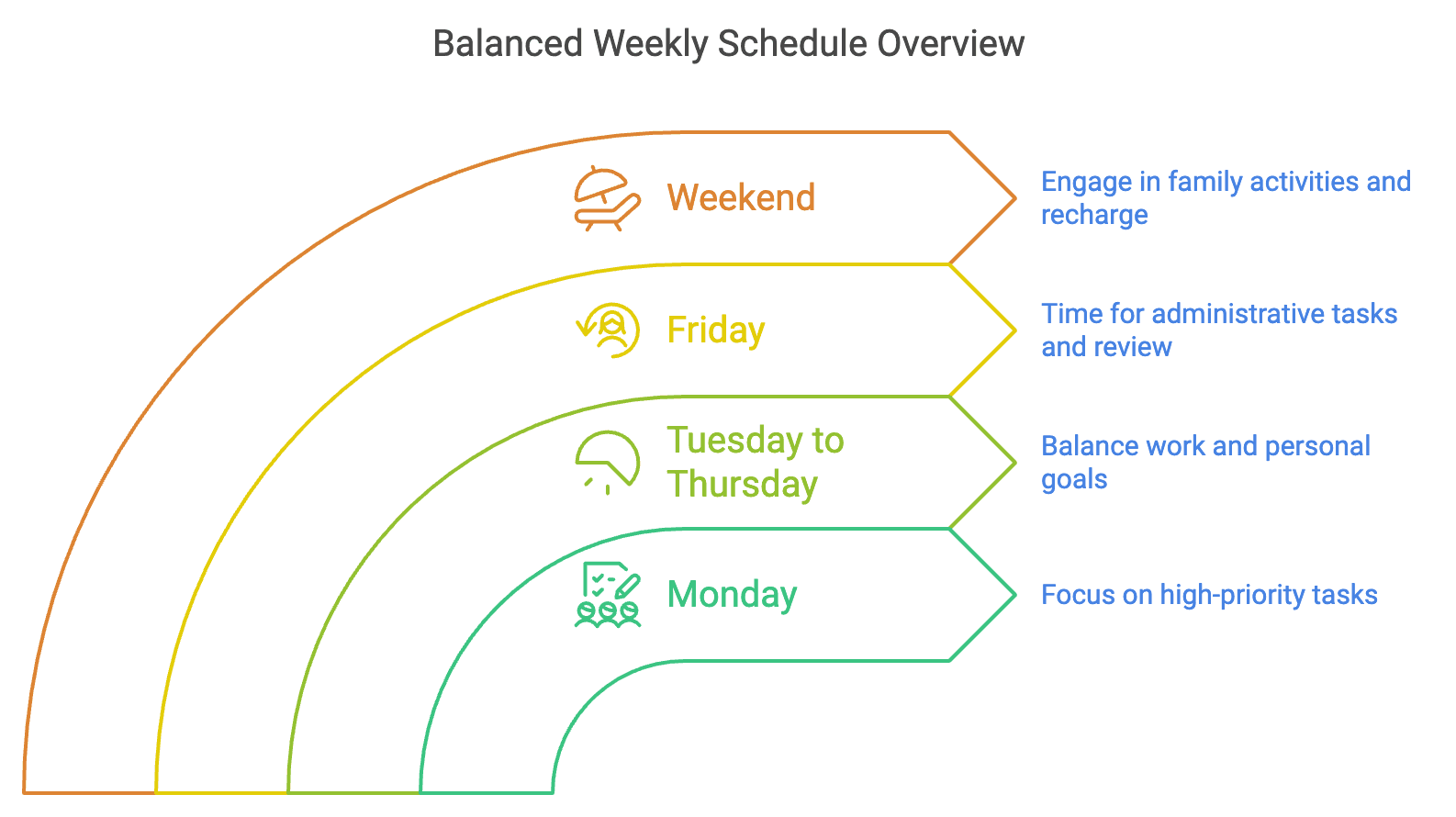
Sample Weekly Schedule in BeforeSunset AI
Here’s an example of how a balanced weekly plan might look in BeforeSunset AI:
• Monday: Prioritize high-focus tasks such as project planning and important meetings.
• Tuesday to Thursday: Balance work tasks with personal goals. Allocate blocks of time for tasks like research, content creation, or strategic planning.
• Friday: Dedicate time to administrative tasks and review your progress for the week.
• Weekend: Reserve time for quality time with family or engaging in activities that help you recharge for the upcoming week.
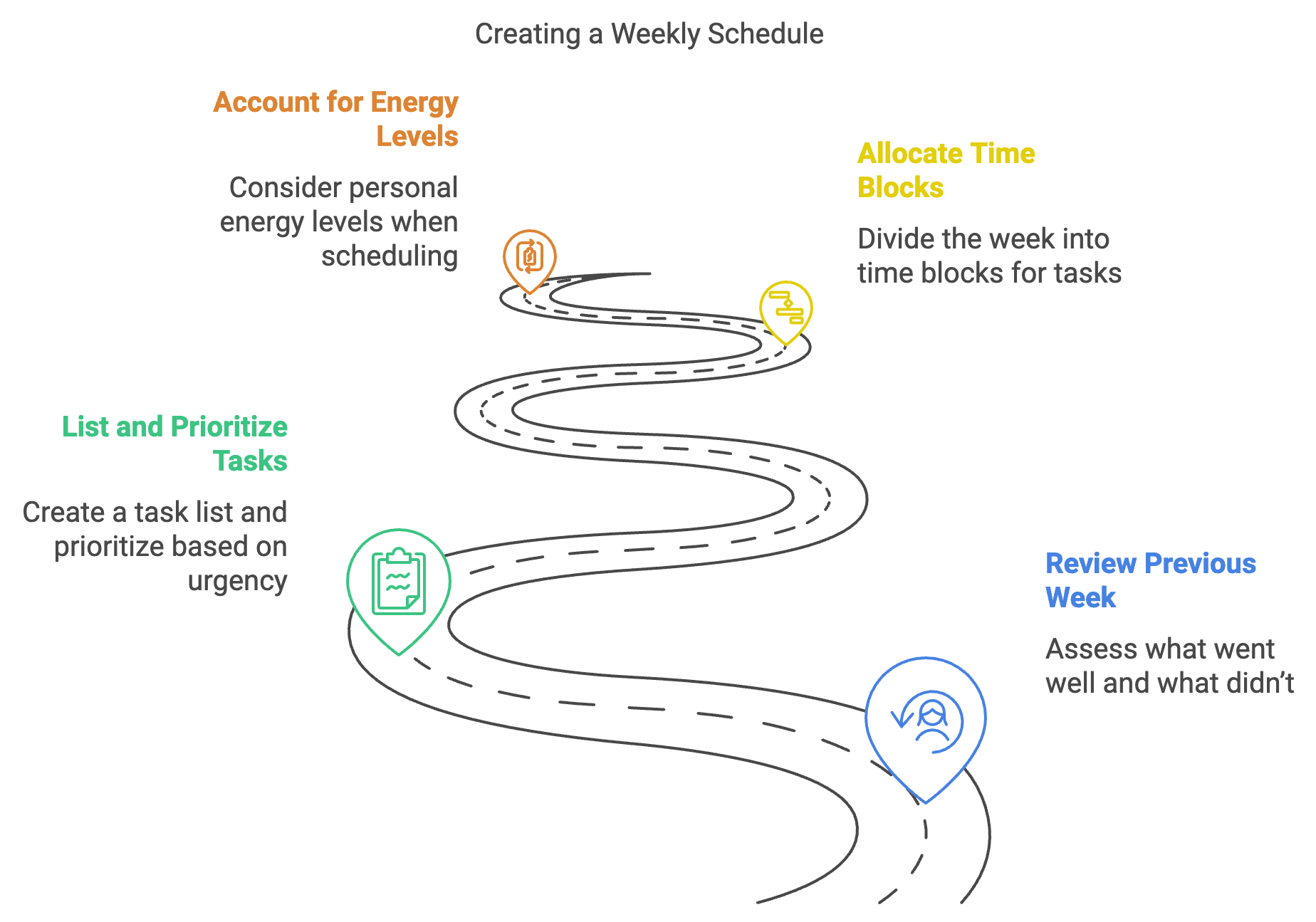
What Are the Benefits of a Weekly Schedule?
Planning on a weekly basis allows you to balance long-term goals with individual tasks. Creating a weekly calendar can help you in various ways:
1. Enhanced Control Over Your Week: With a weekly schedule, you gain better control over your time and can manage both professional tasks and personal goals. By setting up time slots and blocks of time for each activity, you make it easier to tackle tasks on time. This approach is also a great way to reduce stress, especially when unexpected urgent tasks arise, as you can quickly shift and adapt your schedule.
2. Boost in Productivity: Breaking down your yearly goals into weekly plans allows you to work on manageable steps and see consistent progress. By having a specific time for each task and a daily to-do list, you can prioritize effectively, focusing your mental energy on meaningful work while avoiding unimportant tasks that can eat away at productivity.
3. Better Preparation for Upcoming Events: With weekly planning, you can set aside preparation time for any significant events or deadlines in your week. This helps reduce last-minute stress and ensures you’re prepared, whether it’s a client meeting, a family event, or an important personal commitment.
4. Improved Focus and Fewer Distractions: By organizing your weekly tasks and goals, you give yourself a clear roadmap. This minimizes distractions, as you have already allocated time for each responsibility, allowing you to maintain focus and mental clarity.
5. Efficient Time Allocation: Weekly scheduling helps you allocate your time in a way that balances energy levels throughout the week. For example, by planning complex tasks at times when you’re most alert and reserving simpler activities for times of lower mental energy, you can make the most of each day.
Step-by-Step Guide to Creating Your Weekly Schedule
Creating an effective weekly schedule involves a few simple steps that ensure you cover all aspects of your life, from work obligations to personal life.
Step 1: Review the Previous Week
Begin by reviewing your previous week to assess what went well and what didn’t. Understanding how you used your time will allow you to adjust your strategy, freeing up more time for what matters most and reducing time spent on unimportant tasks.
Step 2: List All Tasks and Prioritize
Next, create a task list that includes everything you need to do during the upcoming week. This list should contain work-related responsibilities, personal goals, and family time or self-care routines. After listing, prioritize your tasks based on urgency and importance. Identifying urgent tasks that need immediate attention is crucial for keeping your week structured.
Step 3: Allocate Blocks of Time
Divide your week into blocks of time based on the duration and complexity of each task. For example, allocate longer time slots for complex projects that demand focus, and shorter time slots for routine activities. This way, you can keep your week balanced without overwhelming yourself with too many tasks on any single day.
Step 4: Account for Your Energy Levels
Consider your natural energy levels throughout the day. If you’re a morning person, plan high-focus work in the morning and lighter tasks later in the day. Balancing tasks with your energy peaks ensures that you maximize your productivity without unnecessary fatigue.
Step 5: Incorporate Digital Calendars and Task Management Tools
Using a digital calendar, like BeforeSunset AI, can simplify the weekly planning process. This software helps you organize your weekly schedule, prioritize tasks, and track progress. Digital calendars and task management tools are especially beneficial for setting recurring tasks and reminders, so you can easily follow through on your plans each week.
Tips and Tricks for an Effective Weekly Schedule
To create a successful weekly schedule, keep these tips in mind:
1. Consider Your Needs and Goals: Design your schedule to align with your primary goals, both personal and professional. This focus ensures that you prioritize what matters most to you.
2. Customize Your Schedule: Tailor your weekly plan to your preferences, such as choosing whether you prefer a detailed structure or a more flexible layout.
3. Set Realistic Goals: Avoid overloading your week by setting achievable goals based on your availability and energy. Overcommitting can lead to burnout, so be mindful of what you can realistically complete in a single week.
4. Plan Time for Essential Routines: Make room for routines that support your well-being, such as exercise, meal planning, and family time. By reserving time for these routines, you promote a balanced lifestyle that includes both productivity and personal well-being.
5. Allow for Flexibility: Life is unpredictable, so build flexibility into your schedule. Having some buffer time or open time slots helps you handle any unexpected tasks without derailing your entire week.
6. Review and Adjust Weekly: At the end of each week, assess what worked and what didn’t. This reflection allows you to fine-tune your approach and adjust your weekly goals and schedule as needed.
By using BeforeSunset AI and following these steps, you’ll be able to design a weekly schedule that supports your personal and professional goals, keeps you organized, and ensures you make the most of each week.


